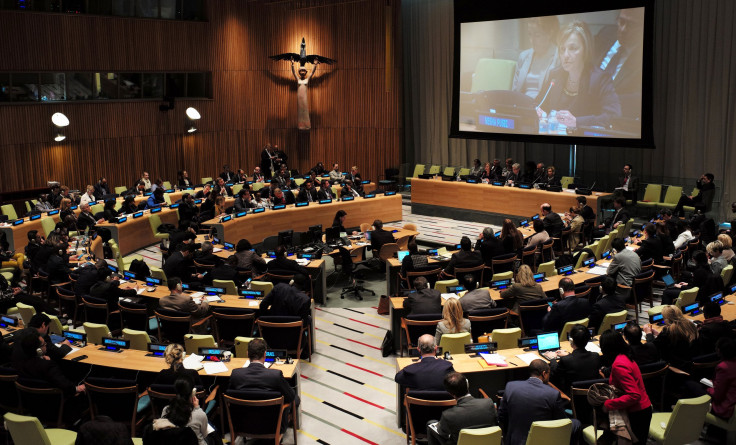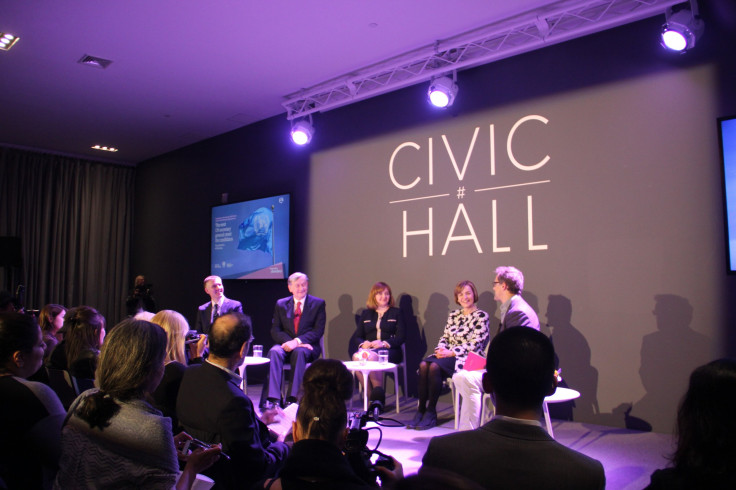UN Secretary-General Selection Process 2016 Goes Public Amid Peacekeeping, Corruption Scandals

It was the opposite of an American political debate: there was no shouting or finger pointing. Instead four candidates vying for the role of United Nations secretary-general gave polite, if sometimes unsubstantial, answers to complex policy questions before a New York City crowd Wednesday evening.
For the first time in the United Nations’ 70-year history, candidates for a position often described as one of the most difficult and important in the world are presenting their visions for the role to the General Assembly and the public. In a move meant to give more transparency to an organization stung by recent corruption and peacekeeper sex assault scandals, United Nations secretary-general hopefuls are answering questions this week on how an organization that represents 193 nations, has more than 40,000 staff members and a yearly budget exceeding $5 billion should be run amid crucial global issues such as climate change, terrorism and an ongoing refugee crisis.
“It’s revolutionary for a very bureaucratic organization like the U.N.,” said Jean Krasno, a lecturer at the Colin Powell School at the City College of New York who is also the campaign chair of the effort to elect the first female secretary-general. “The member states finally stepped up and said we are fed with the Security Council doing this in a secret way and we want to be a part of it. We want to know the candidates.”
Four candidates -- Igor Lukšić of Montenegro, Natalia Gherman of Moldova, Vesna Pusić of Croatia and Danilo Türk of Slovenia -- spoke Wednesday at the first event of the selection process open to the public. They attempted to answer wide-ranging questions including whether they would describe themselves as feminists and how they were paying for their campaigns.

“The United Nations these days has to be stronger, more adaptable and deliver faster and more efficient on the agenda, putting people at the center and leaving no one behind,” Gherman said. “We do not have the luxury of time.”
While four candidates spoke Wednesday, nine in total have stepped forward to take on the position. As part of the new transparent process, they have posted their resumes and vision statements online. There’s no deadline to declare a candidacy, meaning a last minute dark horse entry remains a possibility.
“It’s a very minute, small improvement,” audience member and political risk analyst Anders Corr told International Business Times when asked about the new, more transparent method of selecting a secretary-general. “But ultimately that humans around the earth aren’t voting makes it an undemocratic process.”
In the past, the selection process involved backdoor politicking that experts argue favored male candidates who were savvy networkers. While members of the U.N. Security Council -- including permanent members with veto power such as the U.S., U.K., France, Russia and China -- will ultimately put forward the name of a secretary-general they prefer, the General Assembly has to approve that candidate by a two-thirds majority. This year’s new process means the Security Council may have to listen to the General Assembly more than it ever has in the past.
“For us it’s important to hear what others think, and I’m sure they will not be shying away [from] telling us who they like, so it’s going to be an interesting process," Russian U.N. Ambassador Vitaly Churkin told Reuters this week. Churkin admitted the more transparent process could have an influence on countries holding veto power, although Russia has openly pushed for the next secretary-general to hail from Eastern Europe.
So far the candidates include former heads of state, government ministers and current heads of U.N. agencies. Four of the nine candidates are women, as momentum has grown for the organization to choose its first female head. Seven of the candidates hail from Eastern Europe, a region that has never been represented by a secretary-general. The final batch of candidates will appear Thursday before the U.N.’s General Assembly to take questions from member states in an event that is being webcast. In June, the candidates will be in London to again speak in an open forum.
“For the first time the general public will get a look into how the candidates perform, who they are and what they will bring and not bring to the post,” said Yvonne Terlingen, a member of the steering committee for the campaign 1 for 7 billion campaign that has been pushing for almost three years for increased transparency and reform at the U.N. “I would look to see what they identify the challenges to be and to see whether they have a solid program on how to meet those challenges.”
The other NY election: first ever #UNSecGen public debate in history of UN. Who said change cant happen at the UN?! pic.twitter.com/ThGn4NhmPr
— Aarthi Gunasekaran (@aarthikaran) April 13, 2016
Like the American presidential debates, candidates had difficulty Wednesday laying out concrete plans in response to challenging questions. When an audience member who works at the U.N. asked about reforming the intergovernmental organization, candidates hedged with generic responses.
When Secretary-General Ban Ki-moon steps down at the end of 2016 after two five-year terms, his replacement will be faced with numerous problems and challenges including mounting revelations of widespread sexual assaults by U.N. peacekeepers in the Central African Republic, implementing the ambitious 2030 agenda that strives to reduce inequality and ensuring the historic Paris climate agreement is followed.
Terlingen is pushing for even greater reform at the U.N., arguing for no back room deals and to have candidates pledge to only serve one non-renewable term with the view that it would strengthen the position. When asked Wednesday night about only serving one term, the candidates all gave noncommittal answers.
The anticipation of a new secretary-general has resonated well beyond the traditional reach of the U.N., with bookies having already gotten into the selection process and setting odds on another candidate. Current U.N. Development Program head and former New Zealand Prime Minister Helen Clark has seven-to-two odds among British bookies.
By July, a closed-door straw poll is likely to take place and the General Assembly could be presented with final candidate options as early as September. Despite the increased transparency of the new selection process, activists and citizens alike still want more.
"There should be more than one candidate put forward by the Security Council to the General Assembly so that you bring democracy into the process," Terlingen said. "Because at the moment it is not there.”
© Copyright IBTimes 2025. All rights reserved.





















